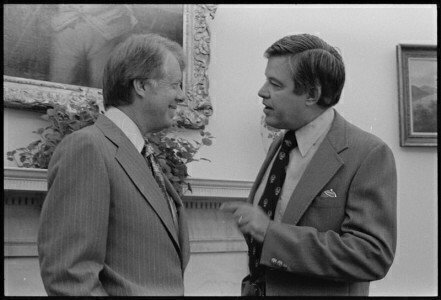On January 27, 1975, Senator Frank Church led a new Senate committee formed to investigate allegations of U.S. government spying on its own citizens. The committee’s report laid the groundwork for today’s controversy over NSA surveillance programs.
 Back in the post-Watergate era, Church and his colleagues weren’t concerned with international terrorism. But there was an overseas connection to Chile. The committee was a reaction to revelations that the FBI and CIA appeared to engage in unconstitutional surveillance of Americans during the era.
Back in the post-Watergate era, Church and his colleagues weren’t concerned with international terrorism. But there was an overseas connection to Chile. The committee was a reaction to revelations that the FBI and CIA appeared to engage in unconstitutional surveillance of Americans during the era.
Link: Read The Church Committee Report
There are elements of the story that seem familiar today. On December 22, 1974, Seymour Hersh, a New York Times investigative journalist, reported on a previously confidential CIA operation involving Chile.
Part of Hersh’s report also detailed what appeared to be illegal spying operations on thousands of Americans by their own government.
The Church Committee labored against government concerns about revealing confidential information and it didn’t receive wide bipartisan support in Congress. But its resulting reports in 1976 led to momentum in Congress to pass the Foreign Intelligence Surveillance Act (FISA) of 1978. Under FISA, the National Security Agency would now work with the secret Foreign Intelligence Surveillance court to approve surveillance on Americans and foreign nationals.
Link: Read The Foreign Intelligence Surveillance Act
Revelations in the Church Committee report included the early existence of NSA surveillance programs that dated back to the Truman administration and the Vietnam War. Project Shamrock started in 1947 and it allowed the government to copy telegrams sent overseas without obtaining warrants. Five years later, Truman formally established the National Security Agency to handle such efforts.
In the 1960s, the NSA started another operation, Project Minaret, to monitor the communications of “watch listed” individuals without a warrant. People on the watch list included those who attended public protests about the Vietnam War, such as Muhammad Ali, Dr. Martin Luther King Jr., and even Senator Frank Church.
During the Church Committee hearings, Senator Walter Mondale publicly asked if the NSA "could be used by President 'A' in the future to spy upon the American people, to chill and interrupt political dissent."
Activities related to FISA in the post-Watergate era went mostly under the radar until New York Times reporters James Risen and Eric Lichtblau revealed in 2005 that the government bypassed the secret FISC court to conduct surveillance on Americans in the days after the 9/11 terrorist attacks.
In retrospect, the Church Committee’s legacy is the attention it gave to constitutional issues and the balancing act between personal freedoms and national security. “It is this indifference to constitutional restraints that is perhaps the most threatening of all the evidence that emerges from the findings of the Church Committee,” said historian Henry Steele Commager.
But the committee had its critics. In 2007, Charles Fried told PBS that it has a mixed legacy at best that is tied to the Watergate era. “FISA is one of the bad prices we're paying for Nixon,” Fried told Bill Moyers back then, in a discussion about the Bush administration’s interpretation of FISA in the post-9/11 era.
Another voice, former CIA inspector general Brit Snider, said in an article on the CIA’s website that the Church Committee helped the NSA operate within the law. Snider was a counsel on the Church Committee tasked to investigate the NSA’s activities. “As upsetting and demoralizing as the Church Committee's investigation undoubtedly was, it caused NSA to institute a system which keeps it within the bounds of US law and focused on its essential mission. Twenty-three years later, I still take some satisfaction from that,” he said in 1999.
Today, the issues in front of the Church Committee still remain in the public arena as a constitutional debate continues over the Fourth Amendment, privacy and national security.







